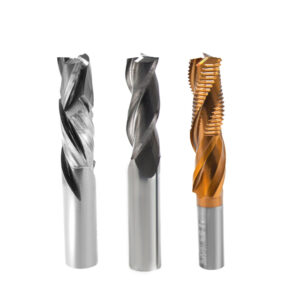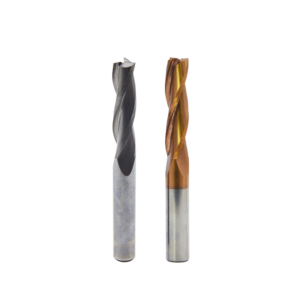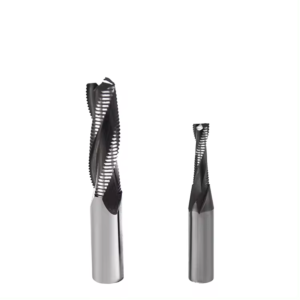Bei Holzbearbeitungsprojekten, spiral CNC router bits have three cutting types: upcut, downcut, and compression cut. Upcut and downcut bits can achieve different cutting effects due to different groove directions.
So how should woodworkers choose the cutting type based on the cutting effect they want? What is the difference between upcut router bits and downcut router bits? In diesem Artikel, we will explain it to you one by one, so that you can easily make your own decision next time when you choose a spiral router bit.
Downcut Router Bits
Downcut bits have grooves that go downward from left to right.
Among the three cutting types, downcut router bits require a relatively slow cutting speed because it takes more time to remove these chips. If the downcut bit is worked at a very fast speed, the accumulation of wood chips in the groove may cause overheating and even damage the bit.
Downcut bits are suitable for creating shallow grooves or mortises in thin and flexible materials such as veneer or laminate to prevent tearing of the top surface. Auch zum Formen eignet es sich hervorragend, Beschneiden und Musterschneiden.
Jedoch, please note that the bottom edge may wear out due to the chips moving downward and being constantly recut.
Up-cut Router Bits
A router bit with a left-to-right upward direction, as opposed to a down-cut bit, is an up-cut bit.
With this left-to-right upward design, wood chips are removed upward and outward from the cut, Hinterlässt eine saubere und glatte Unterseite des Werkstücks. Gleichzeitig, they can achieve faster cutting speeds due to the efficient removal of chips. Zusätzlich, up-cut bits can stay sharp longer due to the lack of accumulation of chips and dust in the cut.
Jedoch, up-cut spiral bits cause wear on the top surface of the workpiece, so they leave a rough top surface and a clean bottom surface. This type of drill bit is often used to make mortises and deep grooves or blind holes.
Compression Bits
Compression bits combine both up-cut and down-cut, hence the name “compression”.
It is easy to create smooth and clean edges on both sides of a workpiece using a compression bit. The up-cut portion pulls out chips quickly, and the down-cut portion smoothes the top and bottom edges.
Compression drill bits are more expensive than the other two types due to their complex design. Compression drill bits are perfect for producing clean surfaces on both sides when cutting materials such as plywood, Furnier, and laminate. If you have enough budget and know how to use it properly, compression drill bits are definitely your best choice for producing clean edges.
Choosing the right tool is essential to creating ideal cutting results. Using an undercut drill bit is a wise choice when you need to create shallow grooves, grooves, tongues and mortises and the top edge will be visible. An overcut drill bit is your best choice when you plan to cut deep holes and the top edge will not be seen. Jedoch, sometimes you need both the top and bottom edges to be clean and beautiful, then compression drill bits should appear.



